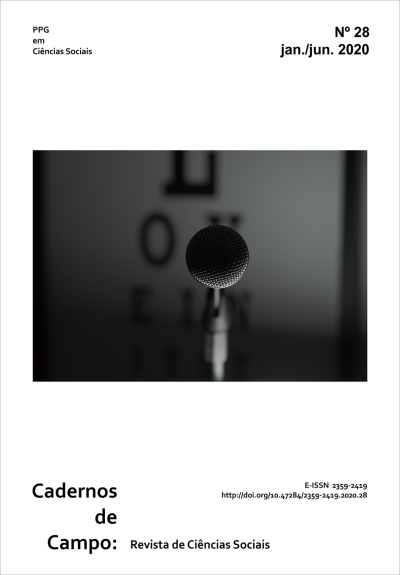Speech on the limits of obedience: enunciates that emphasize or disguise conflicts between Mandetta and Bolsonaro during the crisis of the coronavirus in Brazil
DOI:
https://doi.org/10.47284/2359-2419.2020.28.175191Keywords:
Discours, Authoritarianism, Government, Obedience, Pandemic,Abstract
This paper analyzes declarations by the Brazilian Minister of Health, Luiz Henrique Mandetta, during the pandemic period, caused by the new coronavirus, in March 2020. Through the theoretical-methodological reference of the French Discourse Analysis, the meanings produced through speeches are compared in two press conferences, before and after President Jair Bolsonaro’s speech, minimizing the effects of the disease and reacting negatively to the containment measures adopted by Brazilian states, based on the guidelines of the Ministry of Health, endorsed by the World Health Organization (WHO) and following measures implemented by other countries. The different political and scientific points of view ended up with the minister being fired by the President. Thus, we reflect on the meanings of democracy, authoritarianism, trust and obedience in the clashes of power relations. The discursive analysis of the speeches of the Minister of Health brings the (un)visible presence on the government’s stance regarding the pandemic, supporting elements of authoritarianism, causing disinformation among Brazilians.Downloads
References
ARENDT, Hannah. As crises da república. São Paulo: Perspectiva, 2017.
AUSTIN, John. Quando dizer é fazer. Porto Alegre: Artes médicas, 1990.
AUTHIER-REVUZ, Jacqueline. Palavras incertas: as não coincidências do dizer. Campinas: Editora da Unicamp, 2000.
BERLIN, Isaiah. Dois conceitos de liberdade. In: _____. Estudos sobre a Humanidade - Uma antologia de ensaios. São Paulo: Companhia das Letras, 2002.
BOLSONARO, Jair. Pronunciamento do presidente da República, Jair Bolsonaro. Planalto. YouTube [on-line], Brasília, 24 mar. 2020. Disponível em: <https://www.youtube.com/watch?v=Vl_DYb-XaAE> Acesso em: 04 abr. 2020.
COURTINE, Jean-Jacques. Análise do discurso político: o discurso comunista endereçado aos cristãos. São Carlos: EdUFSCar, 2014.
ESPINOZA, Baruch. Tratado teológico-político. São Paulo: Martins Fontes, 2014.
FOUCAULT, Michel. Microfísica do poder. 28 ed. Rio de Janeiro: Paz e Terra, 2014.
FOUCAULT, Michel. Ditos e escritos IV. 3. ed. Rio de Janeiro: Forense Universitária, 2012.
MANDETTA, Luiz Henrique. Ministério da Saúde atualiza a situação do coronavírus - 19.03.2020. Ministério da Saúde. Youtube [on-line], Brasília, 19 mar. 2020a. Disponível em: <https://www.youtube.com/watch?v=530nK1vKsIc> Acesso em: 04 abr. 2020.
MANDETTA, Luiz Henrique. Coletiva de imprensa sobre Covid-19. TV BrasilGov. Youtube [on-line], Brasília, 25 mar. 2020b. Disponível em: <https://www.youtube.com/watch?v=DZvV0qfCS3Y>. Acesso em: 05 abr. 2020.
STERN, Ana Luiza Saramago. A imaginação no poder: obediência política e servidão em Espinoza. Tese (Doutorado). Programa de Pós-Graduação em Direito, Pontifícia Universidade Católica do Rio de Janeiro (PUC-RJ), 2013.
STIVAL, Mônica Loyola. Governo e poder em Foucault. Trans/Form/Ação, v. 39, n. 4, out-dez/2016. Disponível em: <http://www.scielo.br/scielo.php?script=sci_arttext&pid=S0101-31732016000400107> Acesso em: 27 mar. 2020.
ORLANDI, Eni. Análise de discurso: princípios e procedimentos. 8. ed. Campinas: Pontes, 2009.
ORLANDI, Eni. Recortar ou segmentar? In: Linguística: Questões e Controvérsias. Série Estudos. Uberaba: Faculdades Integradas de Uberaba, 1984, p. 09-26.
PÊCHEUX, Michel. Semântica e discurso: uma crítica à afirmação do óbvio. 4. ed. Campinas: Editora da Unicamp, 2009.
PÊCHEUX, Michel. O discurso: estrutura ou acontecimento? 6. ed. Campinas: Pontes, 2012.









